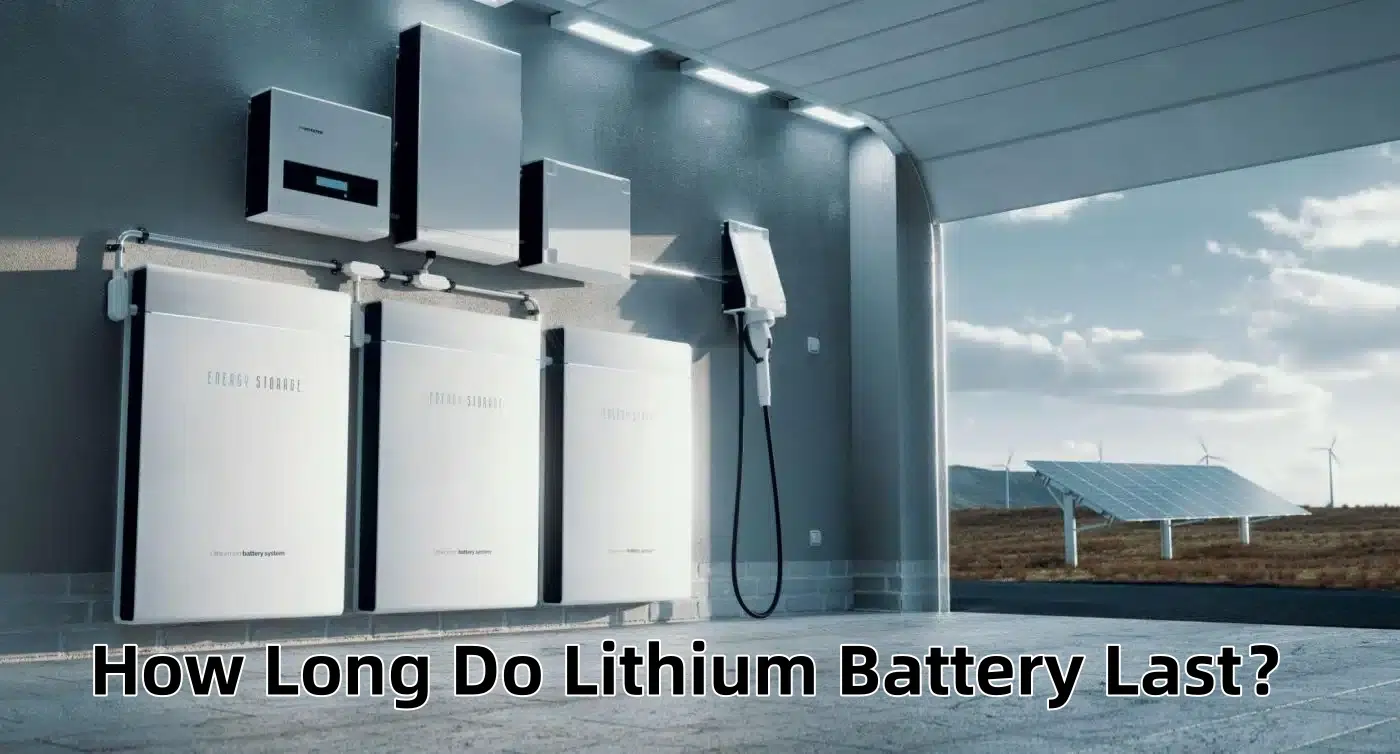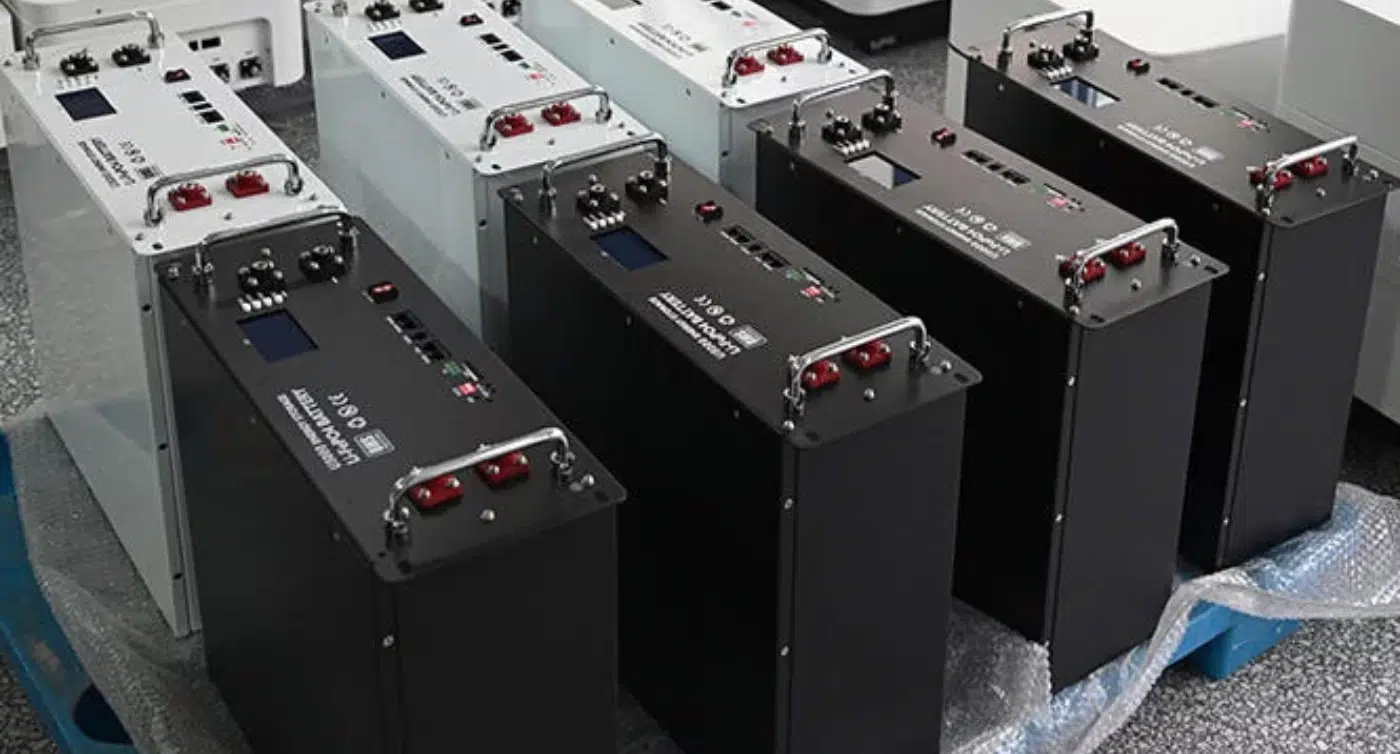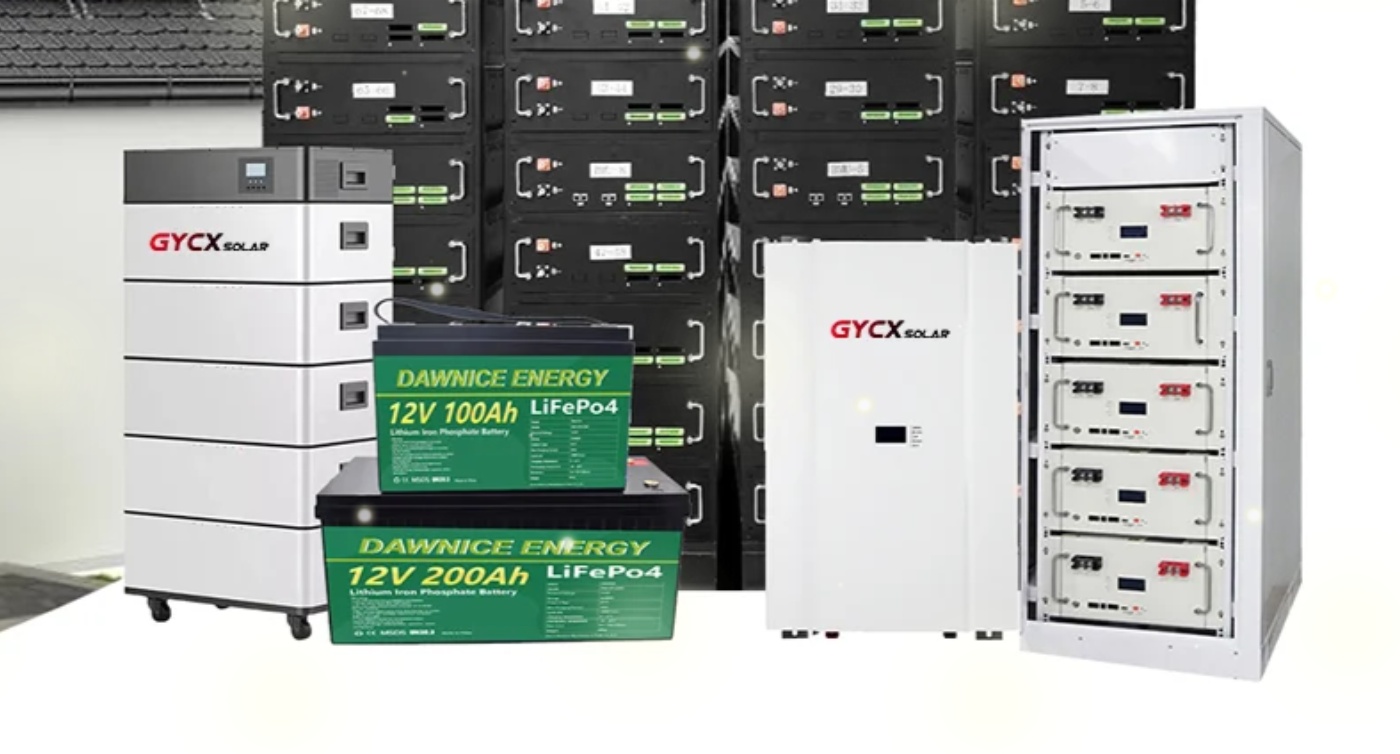L'invenzione della batteria al litio ha cambiato completamente le nostre vite. Alimentano qualsiasi cosa, dagli smartphone e dagli utensili elettrici ai grandi sistemi di alimentazione off-grid e ai veicoli elettrici. Queste batterie hanno una densità di energia estremamente elevata, bassi costi di manutenzione e lunga durata. Ma quanto dura la batteria al litio?? Valgono davvero i soldi??

Qui, impareremo tutto sulla batteria al litio e risponderemo a queste e ad altre domande correlate. Includere la loro vita utile, se scadranno, e come ottenere il massimo dal tuo investimento.
Cos'è una batteria al litio?
Le batterie al litio rappresentano attualmente la tecnologia delle batterie commerciali più avanzata. Usano gli ioni di litio come componente principale, che contiene più elettroni di valenza rispetto ad altri tipi di batterie, il che significa che può immagazzinare più energia.

Le proprietà elettrochimiche delle batterie al litio sono uniche. Può utilizzare una varietà di materiali come catodo, l'essere più comune: litio ferro fosfato, litio nichel-mangano-cobaltato, E cobaltato di litio.
Per quanto riguarda l'anodo, il materiale comunemente utilizzato nella batteria al litio è grafite. La grafite è porosa, ha un'eccellente conduttività elettrica, e ha una buona corrispondenza di tensione con il catodo. Questa combinazione di materiali crea una batteria che non è seconda a nessuno in termini di densità di energia, leggerezza e longevità.
Quanto dura la batteria al litio?
In media, la batteria al litio standard ha una durata di vita di 2-3 anni, a seconda del tipo di batteria e di come viene utilizzata. Tuttavia, se la batteria viene mantenuta correttamente e utilizzata secondo le istruzioni del produttore, la sua durata di servizio può essere estesa a cinque anni.
Le diverse composizioni chimiche del litio e il design del pacco batteria variano notevolmente. Per esempio, solo una batteria ai polimeri di litio soft-pack con una composizione chimica di ossido di cobalto-alluminio può raggiungere 100 cicli di scarico. Tuttavia, Nelle giuste condizioni, le batterie cilindriche al litio ferro fosfato di alta qualità possono superare 20,000 cicli.
Il nostro GycxSolar batteria al litio per ultima 3,000 A 5,000 cicli di scarica e carica utilizzabili in condizioni realistiche. Ciò non significa che la batteria smetterà automaticamente di funzionare dopo 5,000 scarichi, ma che non funzionerà al meglio come una batteria nuova. Nella maggior parte dei casi, le batterie al litio mantengono 75-80% della loro capacità energetica dopo l’invecchiamento.
La durata e i fattori che influenzano la batteria al litio
La durata di una batteria può essere influenzata da numerosi fattori. Ecco alcuni punti chiave:
Scelta dei materiali: La durata della batteria varia notevolmente da materiale a materiale. Per esempio, la durata della batteria dei materiali inferiori è più breve, e la circolazione di celle materiali di alta qualità non è necessariamente garantita, anche se c'è un problema nel processo di produzione, la vita non è poi così male.
Temperatura: Questa batteria è molto sensibile alla temperatura, e le alte temperature ne ridurranno notevolmente la durata. Conservare le batterie agli ioni di litio in un luogo asciutto, un luogo fresco è fondamentale per evitare l'esposizione a temperature elevate e prolungarne la durata.
Compattezza positiva e negativa: Sebbene la compattezza dell'alta tensione possa migliorare la densità energetica della batteria, ridurrà anche le prestazioni del ciclo. Una compattazione eccessiva danneggerà la struttura del materiale e influenzerà la durata della batteria. Inoltre, è difficile per le batterie con elevata compattazione degli elettrodi positivi e negativi garantire un'elevata capacità di ritenzione del liquido. La capacità di ritenzione dei liquidi è la base affinché le celle della batteria completino cicli normali o cicli profondi multipli.
Acqua: Troppa acqua può causare reazioni collaterali di principi attivi positivi e negativi, danneggiarne la struttura, e non è favorevole alla formazione del film SEI, influenzando così la vita.
Densità della pellicola: Una densità incoerente della pellicola influenzerà la capacità e le prestazioni del ciclo della batteria. Minore è la densità del film, migliori saranno le prestazioni della batteria, ma più è difficile da produrre.
Negativo eccessivo: Una quantità eccessiva o insufficiente di materiale negativo influenzerà le prestazioni del ciclo della batteria, con conseguente capacità ridotta.
Capacità elettrolitica: Una quantità insufficiente di elettrolito influirà sulla durata della batteria, principalmente a causa di un'iniezione insufficiente, tempo di invecchiamento insufficiente, o un rapido consumo di elettrolito all'interno della batteria.
Come prolungare la durata della batteria al litio
Mantenere la temperatura adeguata
Le alte temperature riducono la durata della batteria, pertanto si consiglia di conservare o utilizzare questa batteria entro l'intervallo di temperatura appropriato compreso tra 5°C e 20°C.
Scarica e carica parziale
Lo scaricamento e la ricarica parziale di questa batteria possono prolungarne la durata. Evitare scariche profonde 50% DOD aiuta anche a prolungare la durata della batteria.
Mantenere una carica moderata (SOC) livello
Livelli SOC estremi possono comportare una perdita di capacità e ridurre la durata della batteria. Mantenere le batterie al litio a livelli medi riduce al minimo il degrado delle batterie e ne prolunga la durata.
Evitare l'esposizione alle alte temperature
L'esposizione a temperature elevate durante l'uso o la conservazione della batteria può aumentare lo spessore del SEI e innescare l'ossidazione dell'elettrolita, con conseguente perdita di capacità e riduzione della durata della batteria, quindi evitare l'esposizione a temperature elevate.
Sotto chiave
Quando non in uso, conservare la batteria in un luogo in cui la carica è quasi completa 50% ed evitare temperature e umidità estreme.
Evitare la ricarica e la scarica rapida
La carica o la scarica rapida generano troppo calore, che nel tempo possono danneggiare i componenti interni della batteria, accorciandone la vita complessiva.
Utilizzare il caricabatterie originale
L'utilizzo di caricabatterie OEM progettati specificamente per le batterie al litio garantisce che ricevano la tensione e la corrente corrette, prevenendo danni e prolungandone la durata. GycxSolar offre caricabatterie integrati per batterie al litio per caricare le batterie al litio.
Per quanto tempo è possibile lasciare la batteria al litio senza utilizzo?
Il periodo di tempo in cui una batteria al litio può essere utilizzata senza carica dipende da una serie di fattori, compresa la capacità della batteria, il dispositivo installato, e la quantità di energia utilizzata dal dispositivo. Generalmente, la maggior parte delle batterie al litio durano da 2 A 10 anni senza ricarica, a seconda di come vengono archiviati. Tuttavia, questo lasso di tempo può essere più breve o più lungo, a seconda di vari fattori come la temperatura, Modelli di utilizzo, e condizioni di conservazione.
Conservare correttamente la batteria e mantenerla al livello di carica consigliato (SOC) è fondamentale per prolungarne la durata. Vale anche la pena notare che la batteria al litio perde potenza nel tempo anche quando non viene utilizzata e potrebbe essere necessario ricaricarla prima di poter essere riutilizzata.
La batteria al litio scade se non utilizzata?
La batteria al litio non scade davvero, ma consumano una piccola quantità di energia dopo essere rimasti inattivi per un po'. Nelle giuste condizioni, la nostra batteria LiFePO4 consuma 2-3% al mese. Perciò, se non viene caricato per molto tempo, la batteria potrebbe essere completamente scarica. Ciò richiede molto tempo, Anche se, quindi se conservi le batterie in inverno, di solito non avrai troppi problemi.
La batteria al litio deve essere completamente caricata e conservata?
Per batteria al litio GycxSolar, si consiglia di scollegare la batteria da qualsiasi fonte di consumo energetico. Ciò include le radio, orologi e altri piccoli dispositivi. Conservare almeno la batteria 50% carica. Se le batterie completamente cariche vengono conservate nelle giuste condizioni, possono durare un anno intero. Se il tempo di conservazione è più breve, la loro durata potrebbe essere leggermente ridotta.

Come conservare la batteria al litio in inverno?
A differenza delle batterie al piombo, non è necessario rimuovere la batteria e conservarla a temperature superiori allo zero. Generalmente, purché le batterie LiFePO4 siano completamente cariche e scollegate da qualsiasi alimentazione, funzioneranno bene a temperature gelide. Tuttavia, se si prevede che la temperatura scenda al di sotto -15 gradi Fahrenheit, si consiglia di rimuovere la batteria e di conservarla in un ambiente più caldo.
La batteria al litio può essere riciclata dopo l'uso?
Certo che puoi! Dovresti anche riciclare le batterie al litio dopo averle utilizzate. Presso GycxSolar, ci impegniamo a realizzare batterie che non contengano sostanze nocive. Tuttavia, se la batteria va in cortocircuito, c'è ancora un piccolo addebito, che potrebbero costituire pericolo di incendio. Inoltre, la batteria al litio contiene materie prime critiche e limitate. In altre parole, se queste risorse sono esaurite, se ne sono andati. Perciò, dobbiamo riutilizzare il più possibile le risorse esistenti per garantire che ci siano ancora batterie disponibili in futuro.

Il modo più semplice per riciclare le batterie, Poi, è restituirli al luogo di acquisto. La maggior parte dei rivenditori di batterie dispone di sistemi per riciclare le batterie che vendono. Se non, ti diranno dove riciclare la batteria. Puoi anche trovare luoghi di riciclaggio delle batterie al litio su:
www.earth911.com
www.call2recycle.org/locator
Vale la pena investire in una batteria al litio?
Rispetto alle batterie al piombo obsolete, la batteria al litio è senza dubbio una scelta migliore. Sono più leggeri, hanno una maggiore ritenzione della carica e tassi di autoscarica inferiori. Inoltre, richiedono meno manutenzione e durano più a lungo. Anche se inizialmente potrebbero essere più costosi, vale la pena notare il risparmio complessivo che offrono.
Perciò, crediamo che le batterie al litio siano un investimento utile. Offrono un modo affidabile e senza preoccupazioni per immagazzinare grandi quantità di energia, che può tornare utile quando è più necessario.
Conclusione
Le batterie al litio stanno trasformando lo stoccaggio dell’energia, e la loro eccellente longevità e stabilità offrono speranza per l’elettricità sostenibile. Di fronte alla crescente domanda di energia e alle preoccupazioni ambientali, queste batterie ci danno un assaggio di un futuro più verde.
GycxSolar si distingue per la sua batteria al litio di alta qualità, che sono affidabili e funzionano bene, rendendoli ideali per l'energia solare e mobile. Che tu sia un proprietario di casa rispettoso dell'ambiente o un uomo d'affari, investire nelle batterie al litio potrebbe essere la chiave per un efficiente stoccaggio dell’energia.
